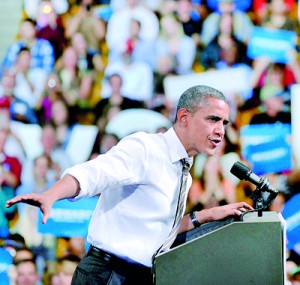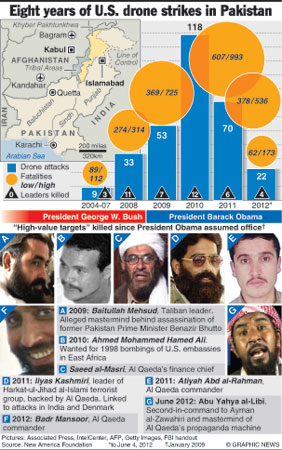Sunday Times 2
Kill and let die: The US James
NEW YORK – By a strange but fitting coincidence, US President Barack Obama and his Republican challenger, Mitt Romney, held their final debate – which focused on foreign policy -just as the new James Bond film, Skyfall, had its world premiere in London. Although 007, who turned 50 this year, is a British-born global brand, his influence on the American political psyche – and that psyche’s influence on Bond – is obvious.

US President Barack Obama speaks during a campaign rally in Boulder, Colorado, on Thursday. Obama and his republican rival Mitt Romney sprinted back onto the campaign trail Thursday, touting rival visions for America to the faithful and the undecided just five days from polling day. AFP
Indeed, the latest production is a British-American partnership, and the violent special-operations action hero that Bond has come to embody reflects US assumptions about foreign policy and the rule of law. The presidential debate merely reinforced the dominant real-time plotline: Assassinating people (including US citizens) solely on the president’s orders, once considered a war crime, has become an applause line.
That is as true for Romney as it has been for Obama. Romney asserted that his foreign policy was “pretty straightforward.” It was, he said, “to go after the bad guys, to make sure we do our very best to interrupt them, to kill them, to take them out of the picture.” In other words, he would “kill them” where they were found, not only on the battlefield, but also in other sovereign countries, such as Pakistan, without charge or trial.
Obama, for his part, scored points by shaming Romney for having opposed the illegal raid that killed Osama Bin Laden. Later, he championed the drone-strike strategy that he has used to “kill bad guys” without charge or trial. Romney cheered. Neither candidate mentioned that, by some estimates, the drone strikes have killed far more civilians than “suspected terrorists.” The most authoritative study puts civilian deaths from drone strikes between June 2004 and mid-September 2012 at 474-881, including 176 children.
Prior to the debate, CNN Chief White House correspondent Jessica Yellin asked Obama about his drone strategy. His vaguely worded answer – the attacks “must be authorised by our laws” – made no mention of trials for those accused of terror crimes, of international war-crimes treaties, or any other bow to legality. Indeed, US law cannot “authorise” drone strikes if they are carried out in countries with which the US is not at war.
Not even Americans are exempt. Obama averred that American citizens “are subject to the protections of the constitution and due process.” But Anwar al-Awlaki was a US citizen whom Obama directed to have killed in just this way. So was al-Awlaki’s 16-year-old son, who was deliberately killed by a drone strike two weeks later.
I happened to watch the debate while surrounded by other American teenagers. They had grown up in a post-9/11 environment saturated with the claim that US presidents may call anyone anywhere a “bad guy” and order his or her summary assassination. “That’s illegal,” I kept saying when the candidates spoke of “killing bad guys” rather than arresting or extraditing them to face criminal charges.
None of these well-educated teenagers believed me. Having grown up with presidents and presidential candidates tossing around the Bond meme virtually without challenge, they thought I was making things up. “Of course it’s legal,” they said. Both candidates had just told the entire world that they planned to continue to engage in what are, according to both US and international law, criminal acts. The debate’s moderator, Bob Schieffer, who should have known better, said nothing.
In the background of this legal and moral failure is major cheerleading about the Bin Laden raid, in which a US Navy SEAL team swarmed a compound in a residential Pakistani neighbourhood and assassinated a lot of people. The book No Easy Day, written by a team member, is a bestseller. Likewise, this month the magazine Vanity Fair published a hagiographic behind-the-scenes look at the steps that Obama and his team took in the run-up to the raid.
What is striking about No Easy Day and the Vanity Fair article is that the rationale for legal due process is reflected in every other paragraph. The sources cited by Vanity Fair confirm that the intelligence on which the team made the decision to “go in” was impressionistic and incomplete (that is, the target, judging from the length of his shadow, was “tall and thin” like Bin Laden, but his identity was not 100% certain). It was also clear from the piece that arresting the man would have been no more difficult – and perhaps easier – than killing him and jeopardising his family.
Like the Navy SEALs and other special-ops teams now roaming the planet in secrecy, Bond is an extrajudicial killer, whether for personal revenge, as in Quantum of Solace; geopolitical reasons, as in Die Another Day; or simply because someone is in his way. His bosses, too, identify targets from afar and order their annihilation, without revealing any awareness of ambiguity concerning who is a “bad guy” or acknowledging the possibility of poor intelligence or mistaken identity. His innocent victims, meanwhile, are invisible. Fabulous military technology is part of the spectacle and becomes its own justification – a character in the hero’s story line.
For 50 years, James Bond and his “license to kill” have stood for imperial justice beyond the limits of law. But he is imaginary, as are his victims. America’s violation of domestic and international law – and the bodies of innocents mown down by drones or operatives – are all too real.
Naomi Wolf is a political activist and social critic whose most recent book is Give Me Liberty: A Handbook for American Revolutionaries.
Copyright: Project Syndicate, 2012. Exclusive to the Sunday Times
Follow @timesonlinelk
comments powered by Disqus























